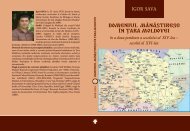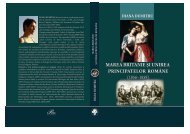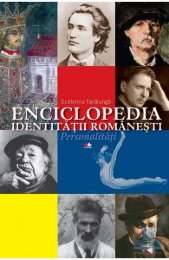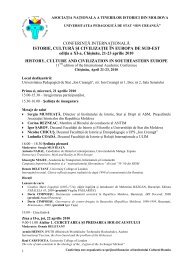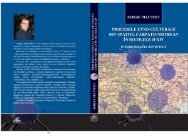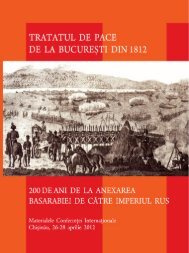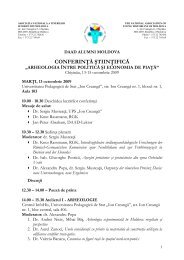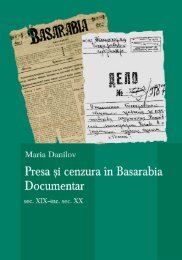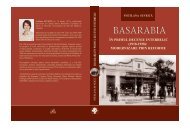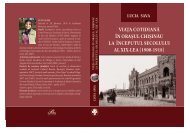Publicatie cu continut integral - Asociatia Tinerilor Istorici din Moldova
Publicatie cu continut integral - Asociatia Tinerilor Istorici din Moldova
Publicatie cu continut integral - Asociatia Tinerilor Istorici din Moldova
Create successful ePaper yourself
Turn your PDF publications into a flip-book with our unique Google optimized e-Paper software.
de memoire. It was not easy because in Latgale local political activization started and local Latgalian intellectuals<br />
tried to develop their own Latgalian project.<br />
By the beginning of the 20th century Latvian intellectuals were strong for declaration of their pretensions to<br />
Latgale. In this context we can mention position of Jānis Endzelīns 1 who took an active part in polemic with Russian<br />
nationalist who were not agree with Latvian status of Latgale. Nationalistic rhetoric of Jānis endzelīns was of<br />
double character. On the one hand he really confronted with his Russian opponents in questions of belongness of<br />
Latgale. In this context he positioned himself as defender of local population of Baltic descent. In fact Endzelīns<br />
criticized Russian perception of Latgale as one of numerous Russian okraina. We can mention facts of polemic<br />
between Endzelīns and Russian linguist Vasilii Bogoroditskii 2 who tried in his works minimize role and influence<br />
of Latvian in Latgale.<br />
Polemizing with him Endzelīns stated that Latvians are able to pretend for three districts of Vitebskaia guberniia.<br />
He wrote that local Latvians had rights for their own schools, churches and administration. In the same time<br />
local inhabitants were for them local Latvians only. He used the word latgalieši but they were not for him separate<br />
nation. He preferred to see in them ethnical group of latvieši only. So Jānis Endzelīns wrote also about Latvian<br />
patriots from Vitebskaia gubernia, but for them they were just enthusiastic linguists who tried to unificate local<br />
Latvian dialect. Endzelīns was the first who proclaimed Latgale as Latvian lieux de memoire. He presumed that<br />
Latvian history started in Latgale and he also mentioned that Indriķis wrote about Latgalians as about Latvians<br />
in general. That is why Latgale was for him part of Latvia and he understood Latgalians as “Catholic Latvians”<br />
only.<br />
The image of Latgale as Latvian lieux de memoire was popular among Latvian patriots but in the First Latvian<br />
Republic they had to co-exist with local Latgalian intellectuals which preferred to underline differences between<br />
Latgale and other Latvian lands. Situation changed after Kārlis ulmanis political upheaval in 1934. Kārlis Ulmanis<br />
was full of enthusiasm in development of Latvian national project, integration of Latvia and development of<br />
new Latvian national identity. In his was for realization of this project Latgale was ancient anachronism. That is<br />
why Latvian authorities tried to integrate it through assimilation. They prohibited local dialect and started <strong>cu</strong>ltivate<br />
in schools literature form of Latvian language which was created by Latvian nationalists in the second half of<br />
the 19th century. It is interesting that majority of Latvian nationalistic leaders were born in Vidzeme, Kurzeme or<br />
Zemgale and they practically have not something in common with Latgale. In such situation Latgale was not their<br />
lieux de memoire, and they and Latvian politicians of inter-war period saw in it large ethnographical museum.<br />
But in 1939 – 1940 the USSR oc<strong>cu</strong>pied Latvia. In 1941 German come as new oc<strong>cu</strong>pants who tried to use<br />
Latgalian intellectuals – they let for them publish newspapers in their dialect. German oc<strong>cu</strong>pation was not too<br />
long and in 1944 Soviet oc<strong>cu</strong>pation started again. Latgalians intellectuals knew that Soviets would not be kind<br />
with them. They presumed that Bolsheviks deported them in Siberia or somewhere else. In such situation they<br />
preferred to emigrate. Red Army brought not only liberations from Germans, but restoration of Soviet oc<strong>cu</strong>pation<br />
also. After 1945 Latgale was studied by Latvian intellectuals but they did it in Latvian, not in Latgalian, spirit.<br />
Official Latvian intellectuals proclaimed that Latgale was one of Latvian lands where traditions of Latvian<br />
statehood and political life started. They also developed narrative that Latgale developed under great influence<br />
from Russian State. Such viewpoint was <strong>cu</strong>ltivated very actively in the second half of 1940s and in the 1950s<br />
when Latvian historical were dependent from Moscow censorship and advices of their Russian colleagues (for<br />
example, from nationalistic orientated Boris Rybakov who taught Latvian intellectuals to glorify progressive Russian<br />
influence) very much. Moreover Latgale was proclaimed as territory where friendship and brotherhood between<br />
Latvians and Russians began. That is why such theories had much in common with political ideology and<br />
propaganda then with objective historical studies.<br />
On another hand, Latvian officially orientated historians did a little in Latgalian studies in the Soviet period<br />
– we can mention mainly ideological works of P. Laizāns, P. Zeile and Z. Springovičs 3 . Woks devoted specially<br />
to Latgale were rare, but they were also written due official Soviet narratives 4 . In the same time denied not only<br />
1 ENDZELĪNS, 1913.<br />
2 BOGORODITSKII, 1909.<br />
3 LAIZĀNS, ZEILE, 1958; SPRINGOVIČS, 1961.<br />
4 BREŽGO, 1954.<br />
– 10 –



